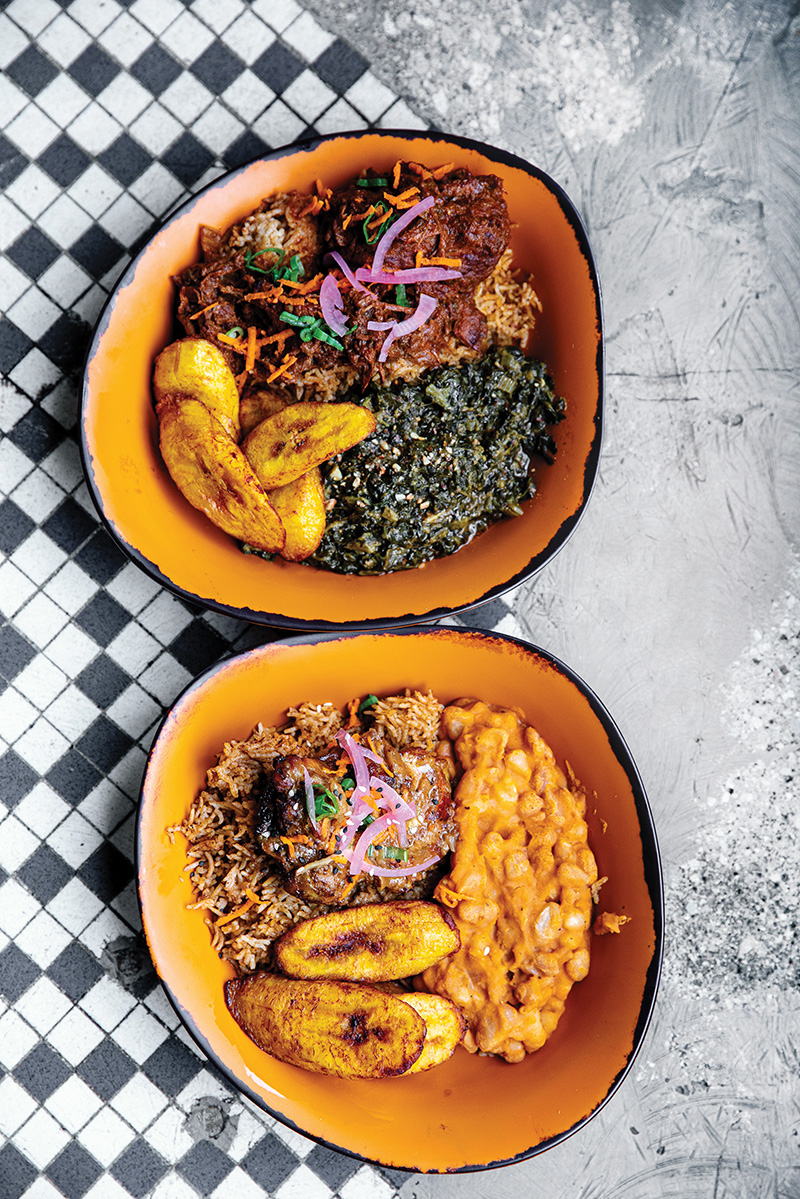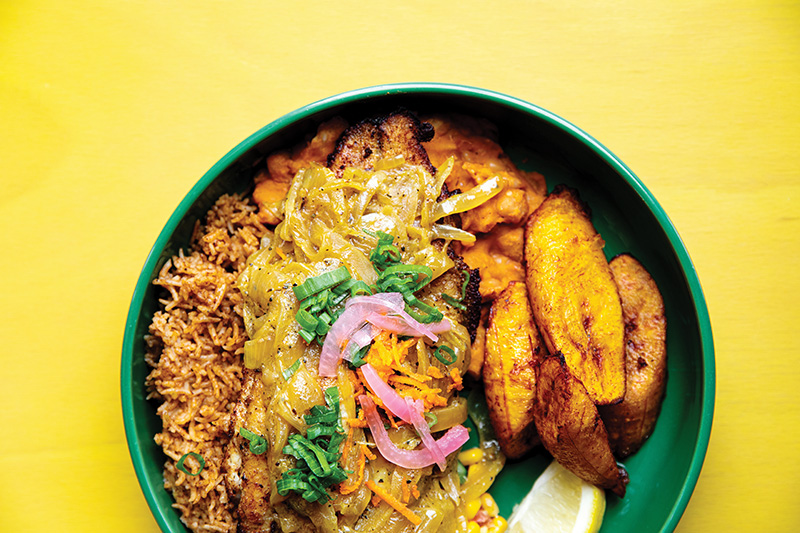
or fragrant coconut rice.
I have one rule when dining out: Never order chicken. For me, eating at a restaurant is an opportunity for exploration. And as a Black woman from a lineage of people who mastered any and every preparation of the prized poultry, I can safely say I’ve traversed the boundless possibilities of the multifaceted bird. Unless it’s cured in sweet elvish honey and served over a bed of salty Beluga caviar, if there’s chicken on the menu, I’m skimming over it.
Detroit restaurateur Mamba Hamissi and I bond over this sentiment. With his new restaurant, Baobab Fare, Hamissi urges diners to surpass their comfort level and venture into culinary territories they’d otherwise evade. Rather than Kuku, a dish that marinades a pan-fried chicken thigh in a robust mustard sauce with translucent, caramelized onions, Hamissi encourages Baobab guests to instead try the Mbuzi. Swahili for “goat,” Baobab’s Mbuzi stars a goat shank that is slow-roasted until the meat is so tender that it slides off the bone as if by the mere suggestion.
For dessert, he challenges guests to resist the urge to order the Mandazi. The fluffy donuts spiced with cardamom and dusted with a sifting of powdered sugar aren’t a far cry from the American donut, thus leaving little room for adventure. Instead, he recommends the Tamu, which opens diners’ eyes to the sweet alter ego of the avocado. Two scoops of silky pudding resembling spheres of matcha-flavored ice cream coated in sprinkles of chia seeds offer a mind-bending experience in taste. An expectation of the mild flavor associated with avocado is met with a tart surprise via the infusion of tangy passionfruit.

Like a faithful steward, Hamissi guides Detroiters through a cuisine that is new to the landscape but dear to his Burundian heritage.
When he and his wife, Nadia Nijimbere, first conceptualized the vision for Baobab Fare, Hamissi saw great opportunity in Detroit, namely for its predominantly Black community. At the time, in 2017, African Americans composed nearly 80 percent of the city’s population. Despite the strong Black presence, Hamissi would learn that Detroit was devoid of a full-service East African restaurant. Anticipating that Black Detroiters would be the strongest supporters of African cuisine, Hamissi marveled at the idea of catering to the community. “I thought, ‘There is not any African restaurant? In a place where the majority of the city is Black? This can’t go wrong.’”
Today, Senegalese restaurant Maty’s on Detroit’s west side and Yum Village, the Afro-Caribbean joint just steps away from Baobab Fare, have garnered attention for bringing West African influence to the city. Still, Baobab offers a unique perspective that had not yet crossed city lines. Until now, Ethiopian eateries in Ferndale and Windsor were the closest options for city dwellers to get a taste of East African cuisine and its wonderfully eclectic foods influenced by the Middle East, India, and Europe. Though she had no professional culinary training, Hamissi trusted Nijimbere’s inherent cooking skills, and the two were confident that Detroiters would welcome their culture with open arms. “We had nothing — no money, no business plan, just an idea,” he says.
The herd of locals in the vestibular entrance waiting to be seated at Baobab Fare on a Saturday night is a testament to Hamissi’s instincts. Since the restaurant’s grand opening in April, Nijimbere and Hamissi have consistently filled the space with hundreds of guests daily. Nijimbere, a timid chef, moves swiftly behind the closed doors of the kitchen, and Hamissi, her outgoing other half, saunters among tables in the dining room. He talks and laughs with diners as if they were guests in his own home.

By early afternoon, the restaurant sells out of its Maracuya Ji, a light, citrusy passionfruit drink served cold in a glass bottle exposing its bright marigold hue. By evening, one or more of the dishes will also sell out — much of the menu is in high demand. It’s a trajectory that the restaurant has followed since the start. In 2017, Nijimbere and Hamissi tested the concept with a series of pop-ups throughout the city. During each occasion, they’d sell out of their inventory within minutes. In less than four years, they’d go on to win the Hatch Detroit initiative’s $50,000 grand prize and become the owners of a Woodward Avenue brick-and-mortar with the stately presence of the historic Fisher Building in its line of sight.
Baobab Fare’s success is matched by its hardships. “If you want to talk about challenges, come talk to me,” Hamissi says with the lighthearted laugh of a man who has seemingly gone through combat.
A year after the couple married in Burundi, Nijimbere’s role as a human rights activist landed their family in danger, requiring the couple to seek asylum in the U.S. — Detroit was the only American city that provided shelter and healthcare support for refugees from East Africa. Nijimbere, who was in the most immediate risk of persecution, arrived in Detroit in 2013. Unknowingly pregnant with fraternal twins, she spent more than two years at Freedom House, a temporary home for those seeking asylum, before Hamissi would arrive in 2015. His daughters likely took their first steps and uttered their first words before meeting Hamissi.

The couple taught themselves English through the cartoons they’d watch with the girls. The education Hamissi had earned in Burundi was not recognized in Michigan, and with no savings or credit history, he couldn’t afford to put himself through school here. Instead, he worked odd jobs as a driver, logging long hours for low wages. “You have to smile sometimes, even when it’s hurting,” he says.
Starting their own business from the ground up seemed to be the only way for the couple to set themselves up financially, yet even in the semifinals round of the Hatch Detroit contest, Nijimbere’s and Hamissi’s refugee status nearly stifled their progress. The use of social media is prohibited among asylum-seekers. That made it difficult for the duo to get the word out about Baobab Fare. Instead, those hit pop-ups at local restaurants did the trick.
Hamissi’s conviction that Burundi cuisine would be well received by Detroiters proved prescient as the community continued to support the business. Midtown Detroit Inc., Prosperus Detroit, and Michigan Good Food Fund helped Nijimbere and Hamissi secure the funding for the space on Woodward. Initially, Hamissi was so stunned by the opportunity that he declined the location. “I thought it was too good to be true.”

Then there was the general contractor whose wife convinced him to build out the space. She thought Hamissi was “sweet.”
Hamissi believes deeply that love and support are earned. “It’s my responsibility to make you love me,” he says. Eventually, he sees Baobab Fare becoming a gathering place for the African community and those looking to learn more about African culture. But first, he says, it’s his duty to earn their trust. “Detroiters are loyal, but you have to give them a reason to support you.”
The trust-building exercise he’s still working on most is among Detroit’s Black community. Turns out, there’s one instinct of Hamissi’s that was proven wrong. “My illusion that everything was going to be well by having an African restaurant in a majority-Black city was wrong,” he says. Diners at Baobab Fare, he’s learned, are a mixed bag of ethnicities, and of the diverse clientele, Black customers seem to be most hesitant to try what Hamissi considers the gateway dishes into Burundi cuisine. “I tell this joke a lot,” Hamissi says between laughs. “I’ll say, ‘You’ve been eating chicken all your life — try something new!’ ” he says.
If he can convince African American diners to follow a guiding principle similar to my own by trying a beef or even a fish dish, he considers it a feat. “Once they try it, this is their home.”
|
|
|









